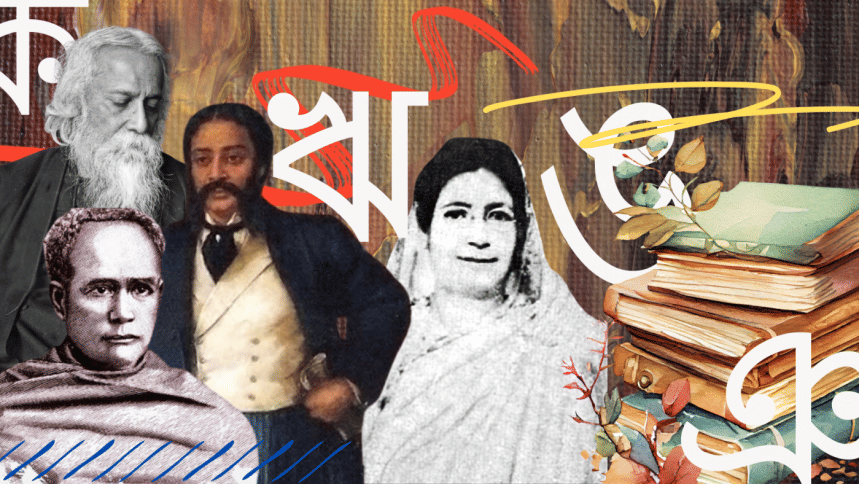What to expect if you want to major in Bangla

Majoring in Bangla promises a journey through a kaleidoscope of academic marvels. It's more than just learning a language; it's an ensemble in which students weave their brains through the bright colours of Bangla culture and history. As they dance with words and phrases, linguistic prowess becomes a living, breathing entity.
When choosing Bangla as a major, one may have many questions. What should you expect if you major in Bangla? What is the curriculum like? What kind of jobs can you get if you pursue a degree in Bangla? We'll discuss all of it here.
What do they teach?
The curriculum of Bangla as a major predominantly revolves around literature. It entails an exploration of various branches of Bangla literature spanning from ancient to modern eras. Prospective students are introduced to various literary forms, including poems, stories, novels, and dramas crafted by diverse poets and writers.
For those aspiring to study Bangla in their undergraduate years, a comprehensive study of ancient treasures like the Charyapada is essential. The curriculum delves into literary treasures, revealing the depth of works such as "Sri Krishna Kirtana", Mangalkavya, and the captivating world of Vaishnava poetry. Sri Chaitanya's teachings resound throughout academics, forming a timeless tale. Pranaya Upakhyana provides an element of emotional appeal, while Maimansingha Gitika and Dobhashi Punthi create vibrant strokes on the canvas of literary discovery.
The epoch of Fort William College's influence on Bangla prose during the modern era is also highlighted. Noteworthy literary figures such as Ishwar Chandra Vidyasagar, Akshay Kumar Dutta, Michael Madhusudan Dutta, Bankim Chandra Chattopadhyay, Rabindranath Tagore, Kazi Nazrul Islam, Begum Rokeya, and Pramatha Chaudhuri along with contemporary authors, find a place in the discourse.
To give credence to this, Sohel Chowdhury, a third-year Bangla student of Jahangirnagar University says, "Everything from Charyapada to contemporary literature is taught in our department. Not only Bangla literature, translated literature and English literature are also taught here. For us, being able to analyse literature is our main task."
Students study Bangla poetic rhetoric and rhythm, learn about the language's historical growth, investigate grammatical structures, and become acquainted with literary forms and customs. The curriculum includes studying excerpts from ancient manuscripts or recent linguistic studies, as well as learning literary criticism and research procedures. This approach provides students with a well-rounded understanding of the linguistic, cultural, and societal nuances embedded in the Bangla language.
Career prospects
After successfully getting a degree, individuals might pursue a variety of professional prospects. Proficiency in Bangla is becoming increasingly important in disciplines such as international relations, diplomacy, translation, and cultural consultancy. Graduates may find work in government organisations and non-profits that require linguistic and cultural knowledge.
Teaching is another popular choice for graduates. The world of journalism requires continuous writing, proofreading and publishing, and majoring in Bangla is of advantage for the same reason. Graduates are finding themselves working in the entertainment sector as script writers and screenwriters for their writing prowess.
But the most popular choice upon graduating is the Bangladesh Civil Service (BCS) examination which offers numerous choices for the graduates. Ahasan Habib, a first-year student studying in the Bangla department at Dhaka University, states, "I like studying Bangla because I love literature. The job sector is great but I want to sit for BCS and this major will help me to stay ahead of the crowd."
Bangla is a mandatory subject which is taught in every school in Bangladesh. The classics such as Lalsalu, Kajla Didi, and Aparichita among many others are a part of our collective identity. However, choosing Bangla as an undergraduate subject is intriguing not only for its career prospects but also for enhancing the imagination and emotions, comprehending and contrasting interactions between various societal components, engaging in debates, accepting and rejecting the views of others, and coming to new conclusions.
Azra Humayra is majoring in Mass Communication and Journalism at the University of Dhaka.

 For all latest news, follow The Daily Star's Google News channel.
For all latest news, follow The Daily Star's Google News channel. 







Comments